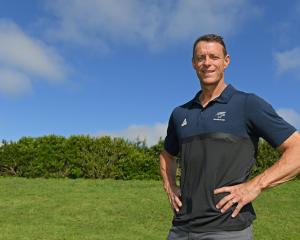The Oceania National Olympic Committee (ONOC) annual meeting got under way in Queenstown yesterday, with International Olympic Committee (IOC) president Jacques Rogge accepting a Maori challenge and giving a short address.
But before one of the most powerful men in sport helped launch the formalities, the four cities - Chicago, Tokyo, Rio de Janeiro and Madrid - jostling to host the 2016 Olympics had a brief chance to present their bids.
The fate of their campaigns will be known when the 115 IOC members cast their vote by secret ballot in Copenhagen on October 2.
With just 10 voting members present at yesterday's meeting, and only 20 minutes to make their case, there was little scope to sway voters.
Arguably, it was more a symbolic gesture, with the real lobbying taking place before and after the various meetings worldwide.
But the show must go on and in a squabble reminiscent of the schoolyard, the representatives demonstrated just how determined they were to garner any advantage no matter how small.
Chicago, who made its bid first, handed out a brochure before the meeting. It had to be rounded up when the Rio de Janeiro contingent complained it was against the rules.
According to an official, handing out the brochure would break with protocol because it would give Chicago an unfair advantage. Of course everyone was free to hand out information after the meeting.
Essentially, there was not much difference between the four, with the campaigning taking into account the global recession and focusing on cost.
Chicago presented a concept which planned to utilise the city's parks and existing sporting facilities, with 85% of the Olympic sports taking place within an 8km radius. President of World Sport Chicago Bill Scherr described the bid, which has a budget of $US3.4 billion ($NZ6 billion), as "affordable and sustainable".
Tokyo has called its campaign "Setting the Stage for Heroes". It also went to considerable lengths to underline the economic viability of its bid. Twenty-three of the 34 venues needed to stage the games already exist and 97% of the events would take place within an 8km radius.
Chief executive of the Tokyo 2016 bid committee Ichiro Kono described the city as "vibrant and exciting, yet beautifully functional". He highlighted Tokyo's enviable infrastructure and its reputation as one of the safest cities in the world.
He told the meeting $US4 billion in funding had already been secured, which exceeds the $US3.8 billion budgeted for the two-week long event.
Rio made a compelling bid. Secretary-general of the Rio 2016 bid committee Carlos Osorio said with Brazil having secured the Fifa World Cup in 2014, it made sense to spread the investment across two major sporting events.
Rio would have to build just one extra venue. He worked hard to cast off Brazil's image as a developing nation, pointing out it was predicted to be the world's fifth largest economy by 2016.
Despite the worldwide recession, Brazil's economy grew 5% last year, and bringing the Olympics to South America for the first time would help inspire the country's 65 million youth.
Madrid looks to be fighting an uphill battle, with the Olympics unlikely to return to Europe so soon. The Madrid team described its campaign as "sustainable and ambitious", and also one which would utilise existing facilities.
The city's mayor, Alberto Ruiz-Gallardor, said only $US317 million was needed to transform concepts for new venues into reality, making it the "safest choice".
Also on the agenda yesterday, five of the seven sports bidding for inclusion in 2016 - karate, rugby 7s, softball, squash and baseball - gave brief presentations. Golf and roller sports were absent.
Squash gave a polished performance, with vice-president of the World Squash Federation Gerard De Courcy telling the meeting 20 million people across 175 countries played the game.
Rugby drafted in some heavyweights, with Fijian great Waisale Serevi and Black Ferns back Hannah Meyers helping deliver the presentation.
"Rugby would be great for the Olympics and the Olympics great for rugby," Serevi said. It might also give the smaller nations like Fiji more opportunity to win a medal, he joked.












